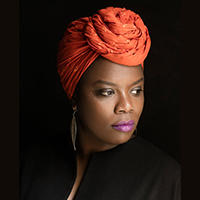 Playwright Antoinette Nwandu ’02 talks about her art as the act of editing – and keenly observing the narratives of the past and the headlines of today. She’s holding a Wintersession workshop about her play Pass Over.
Playwright Antoinette Nwandu ’02 talks about her art as the act of editing – and keenly observing the narratives of the past and the headlines of today. She’s holding a Wintersession workshop about her play Pass Over.
By Truelian Lee '21
The space between the two words Pass Over gave me pause as my eyes skimmed the OFA Wintersession offerings this year. I read it again, mulling over the sounds of each word – pass over – the bluntness of their separation kindling my curiosity.
Written by Antoinette Nwandu ’02, the play premiered in 2017, and draws inspiration from both the biblical Exodus story and from Samuel Beckett’s Waiting for Godot. Nwandu will offer a playwriting workshop for students on Friday, January 24. Each student in the class will have attended a performance of Pass Over, which runs through Feb. 2 at SpeakEasy Stage Company. Nwandu will also be featured in a post-show conversation at SpeakEasy after a performance on January 23.
Nwandu is an acclaimed New-York based playwright who with a Harvard degree in English. She received an MS degree in Cultural Politics from The University of Edinburgh and an MFA in Dramatic Writing from NYU Tisch School of the Arts.
I had the opportunity to call her, during which she elaborated on her sources of inspiration for Pass Over.
“I observed a really beautiful friendship springing up between two of my students and then falling away when one of the students stopped coming to the public speaking class I was teaching at the Borough of Manhattan Community College,” she said. “That sort of creation and rupture of friendships over the course of the semester was very touching to me, and it stayed with me.”

She also drew upon her thoughts and emotions about the murder of Trayvon Martin: “I was very angry at the sanctioned murders of black men. The political strife we’re seeing now began with violence, and now it’s full-blown political rupture. In response to that, as a conduit for my anger, I started writing this play.”
Nwandu elaborated on how the Exodus story and Waiting for Godot influenced her writing.
“I love both of those worlds and both of those texts, though they seem to have diametrically opposed worldviews,” Nwandu said. “Though the Exodus story feels absurd, as the children of Israel wander the desert for 40 years, they do get to the Promised Land, and the fact that they do, and that imagery, is huge for the American anti-slavery movement.”
“Then when you put these texts in opposition with each other,” she said, “you get questions like, ‘Are black people in America like the children of Israel or are they like Didi and Gogo? Are we waiting for a promised land that is actually going to arrive?’”
She called the exercise of bringing Exodus and Waiting for Godot into conversation with each other as a “tool in order to make my ability to think and my thinking more robust and richer and deeper,” and described her writing process as, “puzzle-like.”
“I think one of our first responsibilities as writers is to observe the shape of our own thinking, so the shape of my thinking is puzzle-like,” she said. “I also know that when I’m creating a story, I think of myself more as an editor of a film, because I will write different versions of the scene in takes, and I’ll write the same scene over and over again, and then I’ll have to compile some version of that.”
Nwandu characterized her editing process as “guided by joy.”
“If there’s something wrong in what I wrote, several hours later or days later or weeks later, then that’s good,” she said.
I asked her joy what brings her joy. She replied: “Lately, moments of emotional intensity captured in physical stillness and silence.”
When I asked her about how that related to Pass Over, She took a moment to think about it.
“Pass Over doesn’t really give me joy. It’s a pretty angry play,” Nwandu said. “I guess if something gives me joy, it’s the fact that I have allowed myself to vocalize my anger in such a clear way, and it’s liberating, but the subject matter of the play itself is harrowing.”